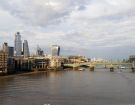Everything for  Business
Business
 Business
Business
 Business
Business
Top officials at the world's largest central banks have coalesced around a simple message to Jackson Hole this weekend: They're willing to finish higher interest rates, even if it does cause some damage.

Top officials at the world's largest central banks have coalesced around a simple message to Jackson Hole this weekend: They're willing to finish higher interest rates, even if it does cause some damage.
Fed Chairman Jerome Powell told the annual meeting of monetary policymakers that the road ahead would "bring some pain to households and businesses" in the U.S., which is "the unfortunate price of lower inflation." Isabelle Schnabel, a senior European Central Bank official, said she and her colleagues had "little choice" but to continue tightening even as Europe's economy slips into a recession that is becoming increasingly likely.
At a two-day conference at Wyoming's Grand Teton National Park, economists presented research that raised more questions than answers and discussed whether the new trends caused by the pandemic would prove temporary or sustainable. But it was widely believed that after decades of working to ensure independence from elected officials, it was time to use it to reduce inflation.
"There's a tremendous determination to do that, and that's really what central banks have been preparing for the last few decades," said Hyun Sung Shin, head of research at the Bank for International Settlements in Basel, Switzerland.
"Institutional support, economics, analytical diagnosis – I think all this is there. And I think we have an institutional structure that encourages central banks to really break through and do their job," he said during a retreat.
Here are some of the key findings of the conference.
Powell and several other Fed officials who spoke in televised interviews Friday on the sidelines of the conference stressed that they do not expect to change course next year, as investors currently assume. Instead, they said they expect rates to rise and keep them at elevated levels for some time. Schnabel did the same during the final panel on Saturday.
"The key lesson of the 1970s is that policymakers should also not stop at the first sign of a potential reversal of inflationary pressures," Schnabel said. President Powell mentioned this in his introductory remarks. If central banks prematurely abandon the fight against inflation, we risk seeing a much sharper correction in the future."
Across the board, policies have given a "sobering message" about the road ahead, said Julia Coronado, president of MacroPolicy Perspectives LLC, who also attended the conference.
"Even the ECB, which has a much higher chance of a recession in the next 12 months than the U.S., knows that the direction of travel is you need to raise rates, and you need to raise rates in a pretty sustainable way," Coronado said. "There's a pretty wide range of nuances in the different circumstances that countries face, and the U.S. is actually probably in a better position next year."
The issue of productivity dominated on the first day of the conference, following the release of the Commerce Department's report on U.S. economic activity the day before.
According to one of the indicators in the report - gross domestic product - the economy shrank by 0.6% in the second quarter on an annualized basis. But another – gross domestic income – suggested the economy grew by 1.4%. The first will mean a decrease in performance, while the second will mean an increase in productivity.
"Almost every conversation I've had since I got to Jackson Hole yesterday has noted that the GDI data for the second quarter that came out yesterday was again much stronger than gdp data," said John Fernald, a San Francisco Fed economist who co-authored a paper on performance, during his presentation on Friday.
These conversations have highlighted uncertainty among policymakers and economists not only about where the economy is headed, but also about where it is now. Central banks may tend to view weaker performance as an increase in inflation risks, which in turn may eventually push them to raise rates even higher.
"The key, the key variable for so many things is performance. This determines the limits on growth. It determines how weak the economy is, which determines what you need to do for monetary policy," said Christine Forbes, a professor at the Massachusetts Institute of Technology. "And we just don't know where it's going to settle after Covid."
A central bank balance sheet document unveiled on Saturday sparked a wave of comments from central banks in the audience, including Bank of England Governor Andrew Bailey.
The world's largest central banks have begun to fold the balance sheets they expanded during the pandemic to ease pressure on banks and keep long-term interest rates low. Asset purchases have created reserves in the banking system, and unwinding is now paying off those reserves.
The question is how much promotion central banks can do before they face potential financial stability problems, and how to adjust if they accidentally go too far.
"In a world of monetary tightening, there's a very difficult question to ask if we need to intervene for financial stability reasons, because buying assets in a world where you're tightening policy is a very difficult message to the outside world," Bailey said.
The vast majority of conference participants agreed that central banks should respond aggressively to price pressures as many countries face the highest inflation rates in decades, although there was less agreement on whether the long-term trends that prevailed before the pandemic would eventually reassert themselves.
This opinion was reflected in Friday's panel discussion. Jason Furman, an economics professor at Harvard University, argued that central banks should eventually consider raising their inflation targets, which most in advanced economies have set at 2% to avoid unnecessary pain for the economies they preside over.
In the final minutes of the conference on Saturday, Bank of Japan Governor Haruhiko Kuroda spoke from the audience with a view from Japan, a prominent player in the global economy, recalling that the problem facing policymakers in most developed countries is not entirely universal.
By the end of the year, Japan's inflation rate "could approach 2 or 3%," Kuroda said. But in 2023, it will "slow down again to 1.5%. So we have no choice but to continue easing monetary policy until wages and prices rise in a stable and sustainable manner."
 As the U.S. IPO market languishes, listings head east to booming China.
As the U.S. IPO market languishes, listings head east to booming China.
 Pound sterling rises as traders ponder the agenda of new British Prime Minister Truss
Pound sterling rises as traders ponder the agenda of new British Prime Minister Truss
 Bitcoin continues to retreat as the 200-week average focuses again
Bitcoin continues to retreat as the 200-week average focuses again
 Private investors buy up retail real estate as major players remain cautious
Private investors buy up retail real estate as major players remain cautious
 The UK is already in recession and heading for stagflation
The UK is already in recession and heading for stagflation
This site uses cookies and other visitor identifiers for the convenience of each user. If you stay on our site after reading this message, it means that you have no objection to the use of these technologies. Learn more
